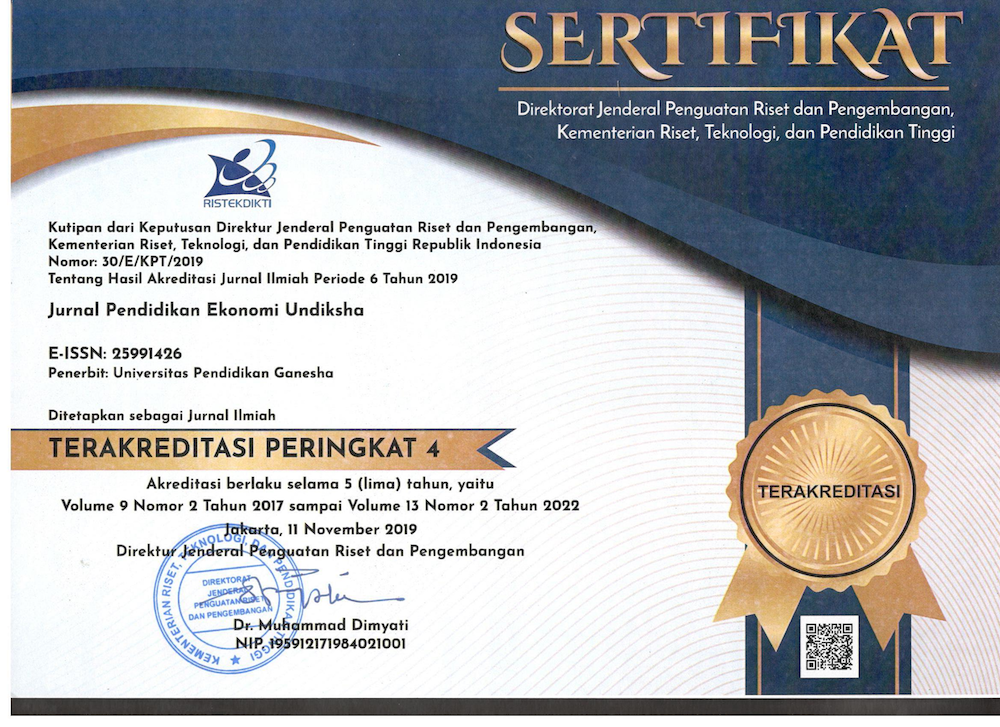ANALISIS SALURAN PEMASARAN USAHATANI JERUK DI DESA KERTA KECAMATAN PAYANGAN KABUPATEN GIANYAR TAHUN 2013
DOI:
https://doi.org/10.23887/jjpe.v4i1.4017Abstrak
Penelitian ini bertujuan untuk mengetahui saluran pemasaran usahatani jeruk di Desa kerta tahun 2013 dengan mengidentifikasi saluran pemasaran yang terbentuk, menghitung jumlah marjin pemasaran dan farmer share, serta menghitung efisiensi pemasaran pada masing-masing lembaga pemasaran. Data yang digunakan berupa data kulitatif dan kuantitatif, sedangkan berdasarkan sumbernya ada data primer dan data sekunder. Jenis penelitian ini adalah penelitian deskriptif dengan pendekatan kuantitatif. Pengumpulan data dilakukan dengan wawancara dan dokumentasi. Hasil penelitian menunjukan bahwa terdapat lima pola saluran pemasaran jeruk di Desa Kerta yaitu: (1) pola saluran I: petani─pedagang pengecer─konsumen, (2) pola saluran II: petani─pedagang pengepul─pedagang pengecer─konsumen, (3) pola saluran III: petani─pedagang pengepul─pasar Jawa (Jakarta), (4) pola saluran IV: petani─pedagang pengepul─pasar (Solo), (5) pola saluran V: petani─pedagang pengepul ─ pasar (Surabaya). Pola I memiliki jumlah marjin sebesar Rp.5.000,00/kg dan farmer share sebesar 61,53%, pola II memiliki marjin sebesar Rp.8.000,00/kg dan farmer share sebesar 42,85%, saluran III, IV dan saluran V memiliki margin yang sama yaitu sebesar Rp.7.500,00/kg dan untuk farmer share sebesar 48,27%. Tingkat efisiensi dari lembaga pemasaran belum efisien karena persentasenya >5%. Pada pola II untuk pedagang pengepul sebesar 14,71%, dan pada pola III, IV dan V sebesar 13,79%. Pada saluran I untuk pedagang pengecer sebesar 8,46%, sedangkan pada saluran II untuk pedagang pengecer sudah efisien dengan jumlah persentase 1,42%. Dilihat secara keseluruhan saluran I memiliki persentase paling kecil yaitu sebesar 8,46% dibandingkan saluran II sebesar 16,13%, dan saluran III, IV dan V masing-masing memiliki persentase sebesar 13,79% hal ini mengindikasikan bahwa saluran yang pendek lebih efisien dari saluran yang panjang.Kata Kunci : saluran pemasaran, efisiensi pemasaran
This study aims to determine the marketing channel citrus farm in the village of Kerta in 2013 by identifying marketing channels are formed, calculate the amount of marketing margin and farmer share, and compute efficiency for each marketing agencies. Subjects in this study is a citrus farmer, merchant collector, and retailers while becoming the object of this study is the citrus marketing channel, which assessed the level of efficiency of the marketing margin and farmer share. Data were collected through interviews and documentation. The data used in the form of data with qualitative and quantitative descriptive analysis with a qualitative approach. In 2013 the results showed that the pattern of orange marketing channels in Kerta village, there are five patterns of marketing channels, namely: (1) channel patterns I: Farmers ─ Retailer ─ Consumer, (2) channel Pattern II: Farmers ─ Merchant Collectors ─ Retailers ─ Consumers, (3) channel pattern III: Farmers ─ Merchant Collectors ─ Market Java (Jakarta), (4) channel pattern IV: Farmers ─ Marchant Collectors ─ Market (Solo), (5) V channel patterns: Farmers ─ Marchant Collectors ─ Market (Surabaya). In channel pattern I the marketing margin is Rp. 5000.00/ kg and the farmer share is 61.53 %, channel II has a marketing margin of Rp. 8000.00/ kg and the farmer share of 42.85 %, in channels III, IV and V have the same amount of margin is Rp. 7,500.00/ kg and for the farmer share of 48.27 %. The level of efficiency of the marketing agency is not efficient because the percentage is >5 %. In the second channel for merchants collectors of 14.71 %, and the channel III, IV and V of 13.79 %. In the first channel to retailers by 8.46 %, while the second channel for retailers has been streamlined with the total percentage of 1.42 %. Viewed as a whole citrus marketing channel in the Village Kerta yet efficient. The most efficient marketing channel is the first channel that has the smallest percentage of the amount by 8.46 % as compared to the other channel is the channel II was 16.13 %, and the channel III, IV and V each have a percentage of 13.79%. This is to tell the short marketing channel more effecien than the long marketing channel.
keyword : marketing channels, marketing efficiency
Diterbitkan
2014-08-26
Terbitan
Bagian
Articles




